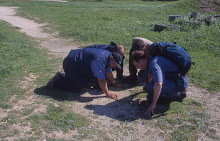The first
ten Etruscan numerals are the following
thu śa
zal senph
ci cezp
huth nurph
mach sar
An
asimmetry is evident. Whereas the first five numbers have clearly no
correspondant in indo-european languages, the last five are more familiar (sar for instance is similar to desa in sanscrit), and are probably
loans. It seems, in other words, that the system of Etruscan had base five, and
that only later it added the numbers from 6 to 10 with loans from the
surrounding countries. This is confirmed by the fact that Latin numbers are
obviously with base five: six is written VI (five and one), seven VII (five and
two), etc. and Latin numbers are certainly of Etruscan origin.
A base five
system can seem primitive, but it allows to count easily up to 25 on your
fingers: it is enough to count the ones on one hand and the fives on the other.
This is not possible with the decimal system, where you have to stop at 10 or
to resort to an
abacus or some other device. This mathematical ingenuity is consistent with the
extraordinary engineering works of the Etruscans – many of the older realizations in Rome are in fact Etruscan, for instance the cloaca maxima.

Nessun commento:
Posta un commento